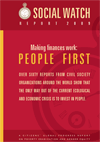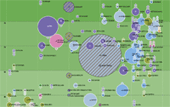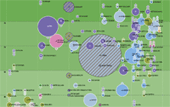2009

People first, Over SIXTY reports from civil society organizations around the world show that the only way out of the curent ecological and economic crisis is to invest in people.
|

The Gender Equity Index 2009 computed by Social Watch shows that the gender gap is not narrowing in most countries and a majority of the countries that show progress are those that were already comparatively better.
|

JEDINÁ CESTA ZE SOUČASNÉ EKOLOGICKÉ
A EKONOMICKÉ KRIZE JE INVESTOVAT DO LIDÍ
|
Published on Tue, 2010-02-09 08:11
"Il Ruolo dell’Italia nella governance mondiale: tra delusioni e speranze della società civile” |
Published on Tue, 2009-11-17 15:01
Wednesday 18 November 2009, 10:30. In view of global crises, human rights must be enforced against economic interests! This Wednesday 18 November, the Germany Social Watch Report 2009, Globale Krisen – Soziale Folgen und politische Konsequenzen (Global Crises - Social impact and political consequences) will be launched in the Convention center in the building of the Federal Press, Room 0107 |
|
Published on Tue, 2009-09-22 08:48
SEPTEMBER 23, 2009 (PITTSBURGH, USA): The two major South-based international civil society networks Social Watch and Third World Network have jointly called on G-20 leaders to address and pledge to greater social and development investment and to enact a more thorough restructuring of the international financial institutions (IFIs). A deeper commitment to address social inequities and the asymmetric structures of IFIs is the most effective way to mitigate the dramatic social impacts of the current economic crisis and prevent future shocks. These networks, representing grassroots organizations in over 70 countries, will present their policy recommendations today September 23 at 12 noon at the Pittsburgh Renaissance Hotel (107 6th Street) in the run-up to the G-20 summit. |
|
Published on Fri, 2009-09-18 14:15
Social investment is the key to a just and effective solution to the current economic crisis, says citizens' alternative report PITTSBURGH, USA (September 23): Robust social investment programs should be enacted in order to effectively stimulate the global economy and mitigate the impacts of the financial crisis on workers, women and the poor, concludes the international civil society network Social Watch in its 2009 Report. This will not only satisfy criteria of social justice but also is sound economic policy, states the Report, titled People First. The report will be launched today, September 23 at 12 noon at the Pittsburgh Renaissance Hotel (107 6th Street) in the run-up to the G-20 summit. People First includes dozens of in-depth reports from grassroots civil society organizations, which prove that the poorest countries played no part in causing the crisis, yet they are experiencing its worst effects. The exclusion of these countries from forums such as the G-20 creates a further obstacle to implementing socially just policies. |
|
The global economic meltdown is already seriously affecting Zambia, which is highly dependent on the production and price of copper, its primary export. Although for the past 45 years politicians have promised to diversify into other products, almost nothing has been done. The Government’s reaction to the effects of the crisis has been both predictable and disappointing. The 2009 National Budget is in denial and Parliament is not paying attention.
|
SUSCRIBE TO OUR NEWSLETTER






